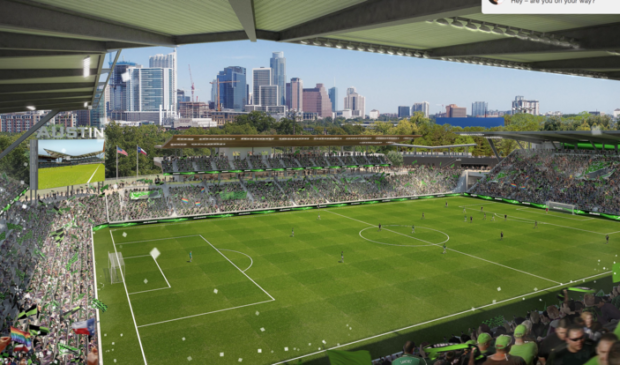City parkland could vanish from soccer stadium consideration
Tuesday, January 23, 2018 by
Chad Swiatecki A resolution is in the works that would remove two city parkland sites from consideration as possible locations for a proposed soccer stadium. Council Member Ann Kitchen is sponsoring the resolution, out of concern about and growing opposition to Butler Shores Metropolitan Park and Roy G. Guerrero Colorado River Metropolitan Park as stadium sites. The stadium would be built by Precourt Sports Ventures to host a Major League Soccer club that the group hopes to relocate to Austin from Columbus, Ohio.
Kitchen said she expects to have a draft resolution posted on the City Council Message Board on Tuesday, and expects the matter to be considered at the Feb. 15 Council meeting. She has voiced her opposition to the possible use of city parkland from the beginning of Precourt’s overtures to city leaders to bring the team to Austin.
“I continue to be excited to see the support for a soccer stadium, and I am happy to hear there’s interest, but it needs to be in the right place and I don’t think our parklands are the appropriate place,” Kitchen told the Austin Monitor by phone on Monday. “My resolution would clarify to staff what we think is appropriate in terms of locations. From my perspective, parkland should not be on the table because we need to protect open space for the future, and there are a number of other good locations I’d support.”
Anthony Precourt, the owner of the Columbus Crew soccer club, has identified Butler Park as his top choice for a possible stadium that could hold up to 20,000 fans. His group has said that finding a site in Austin’s downtown core is the best scenario to attract the investment necessary to relocate the team and build the stadium without public funding.
The group has declined the opportunity to get involved with an open-air stadium and arena complex proposed for the Travis County Exposition Center, a site that had been supported by East Austin officials.
Kitchen’s resolution would bring more uncertainty to the task of relocating the team, with only one city-owned property – McKalla Place near the Domain – under consideration in addition to any privately owned tracts of land in play.
Richard Suttle, an Austin lobbyist working for PSV, said the group plans to talk with city leaders about possible deal structures and other considerations for using parkland before a vote is taken.
“We are hopeful that before the site is ruled out that we can have a conversation about how the parkland can be improved and made more accessible to more Austinites,” he said. “We hope that with more information it might be compelling enough to put the ideas to the voters as prescribed in the city charter. A soccer facility does not have to be inconsistent with public parkland as long as appropriate measures are taken to enhance the park and make it inviting for Austinites from all parts of our city.”
Kitchen said she’s not likely to be won over by arrangements that would see the stadium owners provide funding for maintenance throughout the city’s parks system in exchange for using a parkland site. That position was part of her discussion on Sunday at a rally at Butler Park that saw about 60 residents opposed to any use of parkland for a stadium.
Bill Bunch, executive director of the Save Our Springs Alliance, said the city should find ways to add to its parkland inventory instead of considering deals to turn those properties over to for-profit businesses. He said his group and others on hand Sunday will spend the coming weeks pushing Council members to support removing parkland from consideration.
“We have a shortage of parkland and need more, not less, because as the population grows in the central city we should not be sacrificing any of that for the good of private enterprise,” he said. “The general sense is there’s a whole lot of people in favor of a soccer team in Austin, but the public shouldn’t pay for it with the use of parkland to build a stadium.”
Artist’s rendering of a soccer stadium on Butler Shores courtesy of Precourt Sports Ventures.
The Austin Monitor’s work is made possible by donations from the community. Though our reporting covers donors from time to time, we are careful to keep business and editorial efforts separate while maintaining transparency. A complete list of donors is available here, and our code of ethics is explained here.
You're a community leader
And we’re honored you look to us for serious, in-depth news. You know a strong community needs local and dedicated watchdog reporting. We’re here for you and that won’t change. Now will you take the powerful next step and support our nonprofit news organization?








